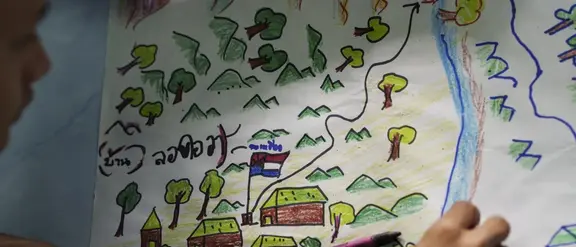Thailand: Human rights for refugees from Myanmar
When there was a knock at her door in Yangon early in the morning shortly after the coup on February 1, 2021, Thayet* knew what was going to happen. Soldiers and armed guards demanded entry and searched the house, but found nothing – her parents and brothers had gone into hiding as a precaution, and her sister, listed as a "subversive activist" by the military, had fled from Myanmar to Thailand shortly before the military coup. Thayet also felt constantly monitored by the military and followed her sister to Thailand.
Thayet is one of approximately 300,000 people who have illegally crossed the more than 2,000-kilometer-long border between Myanmar and Thailand since the coup – a figure determined by the research team "Equality Myanmar," a project partner of Terre des Hommes , which also analyzes the situation of refugees in camps along Myanmar's border region. Thousands of internally displaced persons are hiding there from the military junta's regular airstrikes. The refugees are moving within "Temporary Safe Areas," meaning currently safe territory, but where war could break out at any time and their makeshift shelters could be destroyed. Then they are in dire straits, as the military is pushing them ever closer to the Salween River, the border with Thailand. While the Thai authorities allow the refugees into the country, they deny them any assistance they desperately need. The government claims it has not signed the 1951 Geneva Convention Relating to the Status of Refugees. Terre des Hommes ' partner organizations counter that Thailand has ratified the UN Convention on the Rights of the Child, which in Article 22 requires the protection and legal status of refugee children.
“Shrinking spaces”: In many parts of the world, freedom is being reduced
The plight of refugees from Myanmar vividly illustrates a trend affecting millions worldwide: the shrinking spaces, the ever-narrowing scope for action, where people like those in Thailand and Myanmar can no longer live on safe ground and act freely and autonomously. Around the globe, autocratic governments, surveillance states, and military dictatorships make it more difficult and dangerous for their populations and the civil society opposing them to demand values such as equality, social justice, or the dignified treatment of refugees. Today, barely 15 percent of the world's population still has the opportunity to express their opinions, assemble, and fight against injustices largely unhindered without fear of criminalization. Authoritarian regimes practice intimidation, prohibition, and imprisonment of civil society groups and activists, perpetrate hate speech against specific population groups, employ massive police violence as a "war on drugs," and ultimately, displace entire populations.
"People will win" – "The people will win."
Often, enemies and scapegoats are deliberately created to distract from structural problems and secure one's own power. As everywhere, children are particularly affected, growing up in a climate of intimidation and fear. Basic services such as food, healthcare, and education are cut back on them; for girls, these are often completely denied. Educational curricula are altered, undesirable content is removed, or scientific findings are denied. Further examples include the neglect of birth registration among undesirable population groups in order to keep the number of people in official statistics low and thus also minimize their need for school places and healthcare. In addition, the threat to young activists is increasing; they are attacked, imprisoned, or murdered because they stand up for the protection of their ecological living conditions, name the environmentally destructive companies in their country, and sue them. Here, it is the task of non-governmental organizations in democratically governed countries to demand that their governments refrain from entering into economic partnerships with authoritarian regimes, from exporting weapons, and from specifically promoting civil society cooperation.
Despite all these dangerous adversities, Thayet and the staff of Equality Myanmar remain optimistic. "People will win," they say with firm conviction – the coup regime has no future, even with military superiority, prisons, and torture. That future belongs to the young generation, who are fighting for their rights and will not give up until human and children's rights are no longer foreign concepts in Myanmar.
*Thayet is a name chosen for security reasons. Her real name is known as Terre des Hommes .
Help with a donation